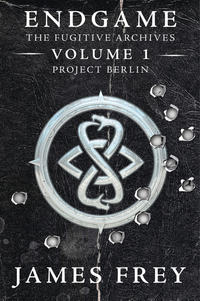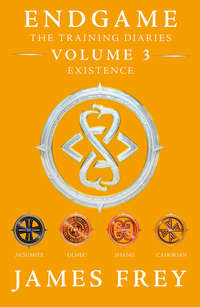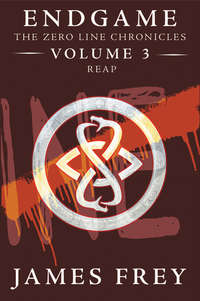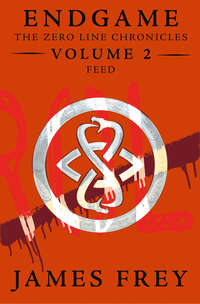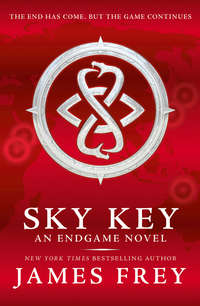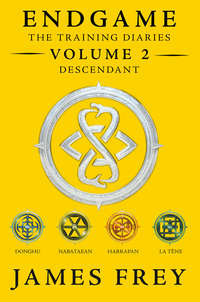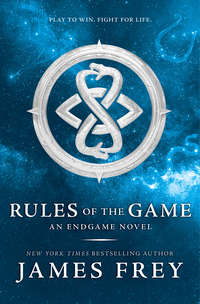
Полная версия
Existence

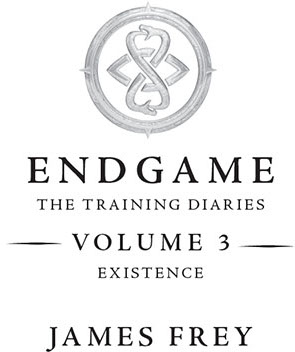

Copyright
First published in Great Britain by HarperCollins Children’s Books 2015
HarperCollins Children’s Books is a division of
HarperCollinsPublishers Ltd
1 London Bridge Street,
London SE1 9GF
www.harpercollins.co.uk
Endgame: The Training Diaries Volume 3: Existence © 2015 by Third Floor Fun, LLC
Cover design and logo by Rodrigo Corral Design
Conditions of Sale
This book is sold subject to the condition that it shall not, by way of trade or otherwise, be lent, re-sold, hired out or otherwise circulated without the publisher’s prior consent in any form, binding or cover other than that in which it is published and without a similar condition including this condition being imposed on the subsequent purchaser. All rights reserved.
Source ISBN: 9780062332691
EPub Edition © May 2015 ISBN 9780007585182
Version: 2015-06-03
CONTENTS
Cover
Title Page
Copyright
Olmec Jago
Shang An
Aksumite Hilal
Cahokian Sarah
Excerpt from Endgame: The Calling
Marcus Loxias Megalos
Chiyoko Takeda
Excerpt from Endgame: The Training Diaries Volume 1: Origins
Minoan Marcus
Excerpt from Endgame: The Training Diaries Volume 2: Descendant
La Tène Aisling
About the Author
Books in the Endgame Series
About the Publisher
Twelve thousand years ago, they came. They descended from the sky amid smoke and fire, and created humanity and gave us rules to live by. They needed gold and they built our earliest civilizations to mine it for them. When they had what they needed, they left. But before they left, they told us that someday they would come back, and that when they did, a game would be played. A game that would determine our future.
This is Endgame.
For 10,000 years the lines have existed in secret. The 12 original lines of humanity. Each has to have a Player prepared at all times. A Player becomes eligible at 13 and ages out at 19. Each bloodline has its own measure of who is worthy to be chosen. Who is worthy of saving their people. They have trained generation after generation after generation in weapons, languages, history, tactics, disguise, assassination. Together the Players are everything: strong, kind, ruthless, loyal, smart, stupid, ugly, lustful, mean, fickle, beautiful, calculating, lazy, exuberant, weak. They are good and evil. Like you. Like all.
This is Endgame.
When the game starts, the Players will have to find three keys. The keys are somewhere on Earth. The only rule of Endgame is that there are no rules. Whoever finds the keys first wins the game.
These are the stories of the Players before they were chosen—of how they shed their normal lives and transformed into the Players they were meant to be.
These are the Training Diaries.
OLMEC
JAGO

Jago falls in love with her at first sight. It’s like some cheesy movie cliché—it’s like every cheesy movie cliché. Their eyes meet across a crowded room. His heart skips a beat. Fireworks explode. The earth shakes. He hears music, smells flowers, sizzles with a lightning bolt of love.
The girl is lithe and lovely, whirling to the techno salsa beat as if her body is made of music. Hair like blond silk whips through the air; slender arms twirl overhead. A radiant smile lights up the room, and Jago’s heart.
Then the strobe lights flash and go dark, the song changes, dancers flood the club floor, and she disappears behind a sea of bodies.
Jago forgets her in a heartbeat.
It’s like that for him: love, girls, beauty. He loves to love, falls hard and fast, gets distracted just as quickly. Sometimes it takes a month, sometimes a week, sometimes, like tonight, only a few minutes. Nothing pleases him more than parading through the streets of Juliaca with a beautiful girl on his arm, lying beside a warm body on the shores of Lago Titicaca, stroking an exquisite face in the moonlight. And because he is Jago Tlaloc, every girl in the city is happy to be loved by him—because to be loved by Jago is to be showered with expensive gifts, to be admired and envied, to be on the arm of the scion of the most powerful organized-crime syndicate in Peru. He knows they love him only for his money and power, and he forgives it. To be loved by Jago is to be forgiven all sins.
To be loved by Jago is to be left by Jago, but ask any girl in Juliaca and she’ll tell you: it’s worth it.
He hasn’t come to the club tonight looking for love. He came to dance, to sweat away the week, to forget himself in a storm of noise and motion. To lose himself in a crowd. Thrashing at the heart of the dance floor, pressed body to body with the crush of strangers, this is the only way Jago can be anonymous, a stranger to himself. He’s spent the last several days doing odd jobs for his family, paying visits to those who thought to cross the mighty Tlalocs … and making them understand the consequences of their poor choices. Reminding them where their loyalties should lie.
The Tlaloc syndicate, of course, employs plenty of muscle—but some acts demand stronger reminders. Some unfortunate souls demand a visit from Jago himself, heir to the family business, Player of the Olmec line. Not everyone knows he’s the Player, of course, like so many eldest Tlaloc sons and daughters before him, or that if Endgame ever comes, he will bear the weight of all their lives. They don’t know they should be grateful to him.
But they know to fear him—and that’s enough.
Jago does what he has to do, hurts who he has to hurt. But sometimes, after, he needs to drink and dance and forget.
So he’s not looking for love, any more than he’s looking for trouble.
Both find him.
Her scream is nearly inaudible over the music and the noise of the crowd, but he’s spent years honing his senses.
There are three of them, muscled thugs in their midtwenties. They have the girl pinned in a dark corner, are laughing at her obvious fear. One of them pokes at her shoulder. Another threads his fingers through her blond hair, smoothing it over her face.
This is when Jago inserts himself into the situation. Three of them, one of him, and he is only 16.
But he is a Tlaloc—and a Player.
He is built like a mountain and could kill all three of them without breaking a sweat.
Instead he says, from behind them, “I think you’d all prefer to find a different club tonight, wouldn’t you?”
The men whirl about, ready to laugh, ready to fight—then they see his face.
They see the scar that cuts from his left eye down to his neck, souvenir of a childhood knife fight. He pulls back his lips in the gruesome imitation of a smile, and they see his teeth, gold-capped incisors studded with diamonds.
“Feo,” the biggest of the men breathes, and when he speaks Jago’s nickname, there’s terror on his tongue.
They know that scar; they know that smile; they know to back away quickly, with shallow bows of respect and apology, to leave this club and never be seen here again.
Jago waves them off with satisfaction, and only then does he turn to the girl.
She’s not hiding behind her curtain of hair or blinking back tears, not pressing herself into the shadows to make herself invisible, not shaken or stirred. She watches him intently, with fierce curiosity, and there’s something strange about her expression, something compelling, and it takes him a moment to understand what it is. Then it hits him.
She doesn’t know who he is.
She doesn’t know anything.
Jago closes his lips over his teeth; he claps a hand over his scar, and hopes the club is dark enough to smooth his pockmarked face. He wants to hide everything ugly about himself.
Something is happening to him.
Something he can’t name.
Not love, it can’t be that, he thinks, because he’s felt love, knows it well, in all its fleeting and shallow glory.
“Those men were afraid of you,” she says in English, her voice full of wonder.
He nods.
“Should I be afraid of you?” It comes out like a dare.
“Probably.” He wants to smile. He wants to laugh. But he doesn’t want to frighten her. For the first time in a long time, he doesn’t want to look like Jago Tlaloc. Maybe he doesn’t want to be Jago Tlaloc, not with this girl, not tonight.
“Good thing this is my summer of bad decisions,” she says, and laughs. “Dance with me?”
He takes her hand, and for a moment he can’t breathe.
“What’s your name?” she asks him, as they step onto the dance floor.
He touches his hand to his ear, cocks his head, as if to say, Too loud, can’t hear you. Then he leads her into the dancing throng. Tomorrow he will be Jago Tlaloc, scion, monster, savior. Tonight he will be just another body in the dark.
“You’re really not going to tell me your name?” she says as he walks her back to her dorm. She’s a British high school girl, on a summer study-abroad program in Peru, though she knows no Spanish. She’s from a place called Cornwall, and is a ballet dancer, or was, she says; she’s not sure which one. She’s been all over the world, she says, but has never seen anything, and though that doesn’t make any sense, Jago almost understands it.
He’s been everywhere too, traveled to every continent, sometimes on family business, sometimes for Player training, always for something ugly and brutal, always for a purpose, never simply to see.
She tells him many things, as they walk hand in hand through the empty Juliaca night, not about her life but about her dreams of a new one, how she wants passion and poetry and awe, she wants new experiences and wild adventures and terrifying risks and world-conquering triumphs.
“And love,” she adds, looking at him steadily. Her grip on his hand is warm and firm, unashamed. “I want earth-shattering, fireworks-exploding, heartbreaking love. Have you ever had that?”
Jago shrugs. “I’ve had girlfriends, if that’s what you mean.”
“No, I don’t mean ‘girlfriends.’” She imitates not just his accent, but the deliberately casual way he tossed off the word. “I mean a soul mate, a person who feels like your other half. A love that changes your life—that swallows it. A Pablo Neruda kind of love.”
“So you loved a man named Pablo?” he asks, confused.
She laughs gently, and links her arm through his. “I see we have some work to do.”
“I don’t know if I believe in that kind of love. A kind that could swallow my life, as you say.” He doesn’t know why he’s admitting this to her. Everything he knows about girls tells him this is the precise wrong thing to say. But there’s something about this one that makes him want to be honest. “My life is too crowded for such a love, I think.”
“Crowded with what?”
“Duty, for one,” he says. “Family.” He can’t tell her that he’s sworn his life to a single, all-important goal. That as long as Endgame looms on the horizon, he can never love anything as much as he loves the Olmec people. Even if it weren’t unthinkable, it would be forbidden.
“Duty?” She laughs again, a familiar song he wishes would go on forever. “You talk like you’re ancient.” Then she shakes her head. “Not me. I wasted too long on duty. I know what’s out there. What’s possible. And I’m going to have it.”
She sounds so much younger than him, but also, somehow, older—because she talks as if time is running out, as if she wants all these things now, here, in this summer, in this city. Tonight.
She stops abruptly beneath a streetlight and takes both of his hands in hers. “Do you want to know a secret?”
He nods.
“This is it. This summer. Everything changes. Everything I used to be, that’s over. I’m breaking free.”
“Of what?”
“Everything holding me back. All the people telling me what I have to do, who I have to be. All the obligations. All that duty. Haven’t you ever wanted to do that? Just shake it all off? Run for the hills? Scream into the night?”
“I—”
She tips back her head and hollers, “Freeeeeee!” The streetlight gives her a glow, like an aura, and Jago is almost afraid to blink—as if he’s imagined her, as if she might disappear.
Everything changes, she said, and he feels it, a buzz in the air, his skin bristling with electric charge. Everything changes tonight.
Tonight, for the first time, he can imagine wanting what she says. Freedom. Escape. Wild adventure with this strange, wild girl, the two of them flinging themselves into a great unknown.
She won’t tell him her name until he offers his.
Even after they kiss under the streetlight beside her dorm, even after she presses her body to his and lets him feel her heat, her need.
“Who are you?” he says in wonder, when they break, and he means, What are you? What kind of strange, enchanting, beautiful creature could make him feel this way, like she’s the first girl he’s ever touched, the first girl he’s ever wanted?
“You first,” she says.
He doesn’t want to offer his real name—this is the twenty-first century; the first thing she’ll do when she goes inside is Google him and his family, and she’ll discover all the things he doesn’t want her to know, the rumors and allegations that inevitably swirl around a crime syndicate even when the government declines to prosecute, or care.
“Most people call me Feo,” he says, offering his nickname instead. It has always felt right to him, as if naming his secret, fundamental truth.
“Feo?” She wrinkles her nose. “Does that mean something?”
Jago laughs. “You really don’t know any Spanish at all, do you?”
“Tell me what it means.”
Her combination of stubborn ferocity with wide-eyed innocence is addictive and irresistible. He can see it in her eyes: this girl is fearless.
“Guess.”
She appraises him carefully, narrows her eyes, smiles. “Mountain.”
He shakes his head.
She presses a finger to his lips, slips it through, taps one of his capped incisors. “Golden boy,” she guesses. “Diamond head.”
“Not even close.”
“Tell me,” she says, and kisses his neck.
“No.”
“Tell me.” She kisses the tip of his nose.
“No …”
“Tell me.” She kisses his palm, the inside of his wrist, works her way up his forearm, and he knows this girl will be trouble—this girl will take whatever she wants from him, and he has much to lose.
“Feo,” he says, giving in. “‘Ugly.’”
She flinches. “Who would call you that?”
He shrugs, smiles to show he doesn’t care, that it’s all a good joke to him. “Who wouldn’t?”
She grazes her fingertips down the length of his scar. “I wouldn’t,” she says softly.
He’s embarrassed, suddenly, not of the nickname, but of the fact that he allows it, and for an impossible moment feels a flicker of rage toward this girl, that she can make him burn with shame. One moment, one spark of anger; then it’s gone as if it never existed.
“Your name is so much better, I suppose?”
“It’s Alicia.” She rises up on her toes, gives him a quick peck on the lips, suddenly demure. “Think you can remember that for next time?”
“Next time?”
She retreats, carefully eases open the door to her girls’ dorm—it’s hours beyond her curfew, but she seems unconcerned, says she’s snuck out before, and anyway, what can they do to her, these overcautious nursemaids? He loves the way she talks.
“You know where to find me,” she says, before she disappears into the citadel. “Just make sure you’ve come up with a better name by the time you come back.”
The following night, Jago takes her to dinner at Los Gatos, an exclusive bastion of candlelit elegance where the waiters keep a bottle of their finest champagne on ice for him, just in case he happens by.
He orders every appetizer on the menu and four entrées, so they can have a taste of everything, and once they’ve sipped their champagne, he summons the waiter and requests a bottle of their most expensive wine.
As they drink the rich red, Jago puts a small velvet box on the white tablecloth. Alicia opens it up to find a small sapphire dangling from a delicate gold chain.
“Oh,” she says, then closes the box and digs into her meal.
It’s not exactly the reaction he was hoping for.
“You don’t like it? I thought it would bring out your eyes.”
“It’s gorgeous,” she says. “But, it’s so …”
“What?”
“Well, it looks crazy expensive, and we just met, so that’s kind of weird, don’t you think?”
“I think it’s beautiful, and you’re beautiful, so it seems like a perfect match.”
She shakes her head. “Well, um, okay. But I don’t really wear much jewelry. It would be wasted on me. So …”
It’s not like it was at the nightclub, or in the moonlight. It’s not easy between them, and he doesn’t know why. He excuses himself to the bathroom, and on his way slips some money into the palm of the maître d’ and makes a whispered request.
When he returns to the table, a violinist comes over to join them and begins a mournful rendition of a childhood lullaby. Jago waves over an old woman shuffling past the tables with an armful of roses, and buys a dozen, gives her a tip ten times their value. He offers them to Alicia—she takes them but doesn’t smile.
“I’m sorry, but …” She stops, turns to the violinist, and says, “That’s lovely, but I’ve got a bit of a headache, so …”
The violinist looks to Jago, who nods his assent, and the musician backs away, looking abashed, surely afraid he’s displeased the monster of Juliaca.
“I’m sorry,” Jago says quickly. He can feel the night slipping away from him, and if he doesn’t understand what he’s done, how is he supposed to fix it? He speaks eleven languages fluently, knows nineteen ways to kill a man with his bare hands, holds this city in the palm of his hands … yet somehow, he’s powerless to make this one girl smile. “I didn’t realize you had a headache.”
“I don’t, I just …”
“Is it a law, in England, not to finish your sentences?” he snaps—then instantly regrets the flare of temper. He’s simply not used to this kind of frustration.
She grins. “Aha! There you are.”
“What? Of course here I am.”
“No, I mean, you. Like, the real you, not this cheesy romance bullshit. The you from last night.”
“Excuse me, cheesy romance bullshit?”
“Flowers, candlelight, champagne, violin music? A necklace, for a girl you’ve just met? I don’t know what kind of girls you usually date, but …”
He dates girls who like “cheesy romance bullshit” and the rewards that come with it. These are the kinds of girls who want to date a Tlaloc—at least a Tlaloc who looks like him. These are the girls who won’t ask hard questions or make demands he prefers not to fulfill.
“And what kind of girl are you, Alicia? What would you prefer to do?”
“How about talk?” she says. “You could tell me about yourself.”
He shrugs. “There’s nothing to tell.”
“You go to school?”
“Sure,” he lies. “Who doesn’t? Junior year’s a bitch.”
“SATs, picking colleges, all that, right?” she says.
He nods like he knows what she’s talking about. Jago’s life doesn’t resemble that of the teenagers he sees on TV. He’s been homeschooled for his entire life, taught by tutors and physical trainers behind the walls of his family’s gated estate, trained not for a life of college and banal employment but for duty, sacrifice, courage, and, eventually, rule.
“I’m thinking about, uh, law school,” he says, wondering if that will impress her.
“Bullshit.”
“Excuse me?”
She stands up. “Do you think I haven’t figured out who you are, Feo? You must think I’m pretty stupid. And I don’t date people who think I’m stupid.”
“Wait! Please!”
Jago stops. Composes himself. All over the restaurant, heads are turning. He can’t afford to be seen like this, begging. Tlalocs do not beg. When he speaks again, it’s with imperious scorn. “What is it you think you know about me?”
“I know you’re Jago Tlaloc, that you’re part of some kind of mob family, and you’re the heir to it all. I know this whole city’s scared of you.” Her voice softens, almost imperceptibly. “And I know you’re a terrible dancer.” She shrugs. “That’s about it. I came here tonight because I wanted to know more—not because I want expensive champagne and jewelry. You can’t buy me, Jago. Not with a fancy dinner, and definitely not with a bunch of crap lies about your life. That’s not who I am. I didn’t think that was who you were.”
“It’s not,” he protests.
“Then prove it,” she says. “Show me who Jago Tlaloc is. The real one. The one I fell for the first time I saw him.”
“You … you did?” He doesn’t understand. No one could fall for him, just from looking at him. His face is not designed to melt hearts; it’s designed to freeze them.
“Of course I did,” she says. “I told you: I’m not stupid.”
They ditch the restaurant. Jago takes Alicia to his favorite street vendor, an old man who grills up anticuchos and picarones just north of the city center. She tries a bite of everything, and the way her eyes light up at her first taste of choclo con queso makes the whole night worthwhile. They sit on the edge of a crumbling brick wall overlooking a vacant lot and stuff themselves, licking the grease off their fingers and kissing it off each other’s lips, passing back and forth a frothing bottle of Pilsen Callao, and all the while, they talk.
Jago tells Alicia about his life, his real life. He doesn’t speak of being the Olmec Player, of course—that secret is as sacred as the oath he swore to protect and serve his line. But he tells her what it’s like to be a Tlaloc, to grow up in privilege surrounded by poverty. To be loved and loathed in equal measure, to never know whether the people around you are freely giving of themselves or obeying out of fear. Jago has his parents and his siblings; he has José, Tiempo, and Chango, three boys he grew up with who he can trust to the ends of the earth. But beyond that, he has minions, underlings, hangers-on, colleagues, enemies.
Sometimes, Jago admits, his enemies feel like the truest thing in his life. At least he always knows where they stand; at least he knows the passion they feel for him is real.
Jago tells Alicia about working his way up, learning the ropes of the family business when he was just a child. Going out on protection runs, defending territory … He lets her believe that he would wait in the car, because to explain that he was a black belt in several martial arts by the time he was eight and spent far more childhood hours with guns, knives, and bombs than he did with cartoons and teddy bears—that would raise questions he can’t answer.
But he doesn’t lie to her.
When she asks if he’s broken the law, he says yes.
When she asks if he’s hurt someone, even killed someone, he hesitates … then says yes.


